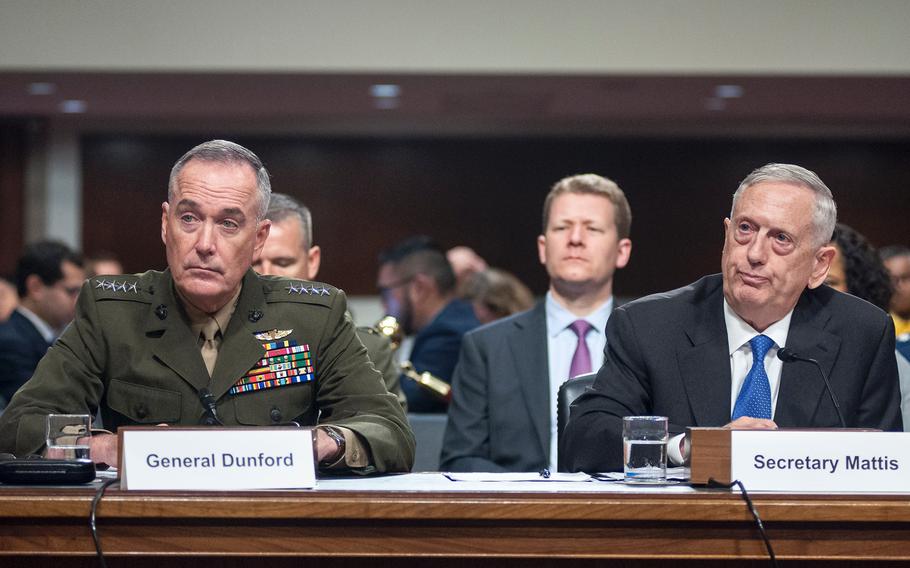
Defense Secretary Jim Mattis and Chairman of the Joint Chiefs of Staff Gen. Joseph Dunford attend a Senate Armed Services Committee hearing on Capitol Hill in Washington, D.C., on Tuesday, June 13, 2017. On Wednesday, Mattis told lawmakers that potentially thousands of additional troops could be deployed to Afghanistan. (Carlos Bongioanni/Stars and Stripes)
WASHINGTON — Defense Secretary Jim Mattis told Senate lawmakers Wednesday that potentially thousands of additional troops could be deployed to Afghanistan to keep the country from sliding into further violence and to prevent the Islamic State from achieving a stronger foothold there.
Mattis told members of the Senate Appropriations defense subcommittee that President Donald Trump notified him at noon on Tuesday that he would not need to seek White House approval to increase the number of U.S. forces on the ground in Afghanistan, a departure from the decision-making process of former President Barack Obama’s administration.
“We will define the way ahead and I will set the U.S. military commitment consistent with the commander in chief’s strategic direction and his foreign policy,” said Mattis, who is spearheading the strategy with Secretary of State Rex Tillerson.
Mattis said he would present a revised strategy to Trump for his approval by mid-July. Mattis would not say how many additional forces that he and Army Gen. John Nicholson, the top U.S. commander in Afghanistan, are looking to deploy. Mattis said he would return to Capitol Hill in a matter of weeks to brief lawmakers on the recommended increase.
Senior defense officials have previously said the new strategy could require between 3,000 to 5,000 additional forces.
Wednesday morning was the defense secretary’s third appearance on Capitol Hill this week as he and Marine Gen. Joseph Dunford, chairman of the Joint Chiefs of Staff, discuss their 2018 budget proposal with Congress.
At each hearing, more details emerged of the proposed new strategy for Afghanistan and potential forces that strategy could require. At a House Armed Services Committee hearing earlier this week, Mattis said the additional forces would likely come from the Army, to provide additional advisers and trainers for the Afghans.
“These are troops that will go out specifically trained by our U.S. Army to go out in the field” with Afghan forces, Mattis said earlier this week.
Mattis said Wednesday that his proposed strategy is also likely to call for inserting NATO air controllers within Afghan units to make air response more effective against the Taliban or ISIS. U.S. and coalition air support for Afghan military operations against the Taliban diminished as the U.S. drew down its forces and ended combat operations there in late 2014. The United States and its allies have invested in and trained Afghanistan’s air force, but it was not ready to assume the mission, Mattis said.
“At one point when we reduced our forces there, I believe in what was probably, in hindsight, a misguided application of our forces,” he said. “We restricted them from using our air support with some idea that we would wean them off the need of it. That meant, in the mountain country, these troops were often fighting at a disadvantage.”
After 16 years of war, there are now about 8,400 U.S. troops in Afghanistan and approximately 5,000 NATO forces. U.S. forces there, at one time, topped 100,000.
Why “risk more American lives [and how will] spending billions more make any difference 16 years from now than it has in the first 16?” Sen. Dick Durbin, D-Ill., asked.
Mattis said the additional U.S. forces would be there to stop any additional resurgence of violence and to dissuade the Taliban of the notion of pursuing additional violence instead of reconciliation talks with the Afghan government.
“Reconciliation is fundamental,” he said. “All wars have to end sometime.”
copp.tara@stripes.com Twitter: @TaraCopp